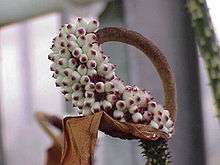Anchomanes
| Anchomanes | |
|---|---|
 | |
| Anchomanes giganteus | |
| Scientific classification | |
| Kingdom: | Plantae |
| (unranked): | Angiosperms |
| (unranked): | Monocots |
| Order: | Alismatales |
| Family: | Araceae |
| Subfamily: | Aroideae |
| Tribe: | Nephthytideae |
| Genus: | Anchomanes Schott |
Anchomanes is a genus of flowering plants in the family Araceae. The genus is native to tropical Africa.[1][2]
Anchomanes is quite similar to species in the genera Dracontium and Amorphophallus, but there are a few apparent differences discovered by Will Jenkinson in 1888. One such difference is that the plants are perennial. Also, the stalks are spiny and the tuberous rhizomes have eyes.[3]
Species
- Anchomanes abbreviatus Engl. - Kenya, Tanzania, Mozambique
- Anchomanes boehmii Engl. - Kigoma region of western Tanzania
- Anchomanes dalzielii N.E.Br. - Benin, Ghana, Ivory Coast, Nigeria, Cameroon, Sudan, Zambia, Zimbabwe
- Anchomanes difformis (Blume) Engl. - much of tropical Africa from Liberia to Tanzania, south to Angola and Zambia
- Anchomanes giganteus Engl. - Gabon, Congo-Brazzaville, Zaire, Burundi
- Anchomanes nigritianus Rendle - Gabon, Nigeria
References
- ↑ Kew World Checklist of Selected Plant families
- ↑ Govaerts, R. & Frodin, D.G. (2002). World Checklist and Bibliography of Araceae (and Acoraceae): 1-560. The Board of Trustees of the Royal Botanic Gardens, Kew.
- ↑ Bown, Deni (2000). Aroids: Plants of the Arum Family. Timber Press. ISBN 0-88192-485-7.
This article is issued from Wikipedia - version of the 12/15/2015. The text is available under the Creative Commons Attribution/Share Alike but additional terms may apply for the media files.